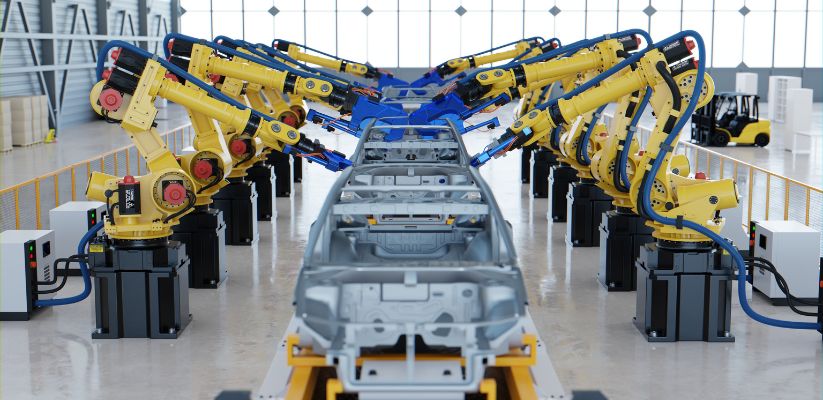The Auto Industry has come a long way since its invention in the late 1800s. Early on, cars were costly, and only the wealthy could afford them. Over time, the cost of automobiles has decreased, and they have become more accessible to the general public.
The design of cars has also evolved over the years. Early automobiles were relatively simple and looked more like horse-drawn carriages than modern cars. In recent years, cars have become more aerodynamic and have navigation systems and climate control features.
The manufacturing technology of cars has changed dramatically. Early auto industry used gasoline engines, while modern cars are powered by electricity. This change has made the development of electric vehicles, which are becoming more and more popular.
Driving Factors For Automobile Industry Evolution
One of the biggest drivers of this technological evolution has been the development of new and better engines. Early automobiles were powered by steam engines, eventually replaced by gasoline engines. These engines became more powerful and efficient over time, and they continue to be improved upon today.
Another major factor in the technological evolution of the auto industry has been the development of new materials. Early automobiles were made from heavy metal alloys, but these have been replaced by lighter and stronger materials such as carbon fibre and plastic. This has made the automobile both faster and more fuel-efficient.
Finally, the development of new transportation technologies has played a significant role in improving automobiles. The invention of the railroad, for example, made it possible for people to travel long distances without having to drive. And internet development has made it possible for people to purchase and research cars worldwide.
All of these technological advances have played a role in making automobiles more accessible and more efficient. And they would execute it even in the years to come.
Also Read : Impact of Artificial Intelligence on the Automotive Industry
Various Ways Manufacturing Technology has been Transforming the Auto Industry
Electrification
It was the time of the late 1890s when the first electrical vehicle came on the road, and then after two decades, electric vehicles started becoming common.
Today, there exist some companies that have been working on solar, wind, and electrical energies. These technologies have been making sustainable electric vehicles. Once these vehicles are purchased, they become economical. Hence, manufacturers are focusing more on investing in electrification methodology that will ensure massive savings through low fuel consumption.
AR Dashboard
We all know that the auto industry is completely transforming nowadays with technology. So, with the help of advanced manufacturing technologies like AR (Augmented Reality), you can change the windshield in a scream to showcase data to the user. With AR, the system can show related data through the screen, like mileage, speed, current weather, RPM, and more. Several famous brands embrace AR features, including Jaguar, Volvo, Toyota, Mazda, and Mercedes-Benz.
Enhanced Safety
Adaptive cruise control, for example, is a great way to help avoid accidents. This technology uses sensors to keep track of the speed and location of other on-road vehicles and automatically adjusts your speed to maintain a safe following distance. It can be a massive help in heavy traffic or on long trips.
Autonomous emergency braking is another excellent safety feature that is becoming more common. It uses sensors to detect when a collision might occur and applies the brakes automatically to help avoid or mitigate an accident. Also, it can be a lifesaver in those split-second situations.
There are many other impressive safety features available on new vehicles, and the automotive industry is continuing to innovate in this area. Technology is making a big difference in improving safety on the road, and that’s good news for everyone.
<<Also Read: How ERP is driving Automobile Industry on the Right Foot?>>
Fuel Cells
Using less fuel, electric and hybrid vehicles produce far fewer emissions than traditional gasoline or diesel vehicles. And, as battery technology continues to improve, we observe even more electric vehicles on the road in the electric vehicles industry. Technology is helping to make internal combustion engines more efficient. Newer machines can burn fuel more completely, resulting in less pollution.
Fuel cells are another promising technology for the automotive industry. Fuel cells convert the chemical energy in a fuel into electricity, with water and heat as the only by-products. It makes them an excellent and efficient way to power a vehicle.
The auto industry is making significant progress in reducing emissions and pollution. New technologies make it possible to produce cleaner, more efficient cars and trucks.
Customised driving experiences
Since the past few decades, there have been many vehicles that are offering customised user experiences. The rise of artificial intelligence has made it easier to deliver vehicle personalisation, while navigation technology helps operations get streamlined. Various factors like driving applications, Chatbots, virtual assistants, etc., allow vehicles to track the driver status to offer safe driving experiences.
Improved connectivity
Technology is always improving, and that includes the automotive industry. With advanced technology, cars are becoming more connected than ever before. This improved connectivity can help with a number of things, from navigation to safety.
One of the most important aspects of improved connectivity is being able to stay connected while on the go. With in-car Wi-Fi, drivers and passengers can stay connected to the internet even while on the road. This can be a great way to stay entertained during a long drive, or to get work done while commuting.
In addition to making life more convenient, improved connectivity can also help make driving safer. For example, many cars now come with built-in sensors that can detect when another car is in your blind spot. This can help prevent accidents.
Overall, improved connectivity is a great thing for the automotive industry. It can make life more convenient and safe for drivers and passengers alike.
Self-driving systems
The automotive industry is on the cusp of a major shift with the advent of self-driving systems. This new technology has the potential to revolutionize the way we travel, making our roads safer and freeing up our time.
However, as with any new technology, there are a few concerns that need to be addressed before self-driving systems can be fully implemented. Firstly, the technology needs to be proven to be safe and reliable. Secondly, the infrastructure needs to be in place to support these new vehicles.
Thankfully, there are a number of companies working on self-driving systems and they are making great progress. The technology is improving all the time and it is only a matter of time before self-driving cars become a reality.
Predictive maintenance for manufacturing industry
In order to stay ahead of the curve, manufacturers are turning to predictive technology to help them make better decisions.
Predictive technology is a form of artificial intelligence that analyzes data to make predictions about future events. This information can be used to improve manufacturing processes, design better products, and even predict customer behavior.
For example, predictive technology can be used to identify trends in customer demand and then adjust production accordingly. It can also be used to improve supply chain management, by predicting disruptions and then planning around them.
Predictive technology is already being used by some of the leading players in the automotive industry, and it is only going to become more important in the years to come. Those who embrace it will be well-positioned to succeed in the ever-changing automotive market.
Also Read: The vital role of ERP in Manufacturing Industry
The Future of the Auto Industry
The future of the auto industry is still being determined. Many experts believe that the industry is in decline and that it is only a matter of time before it disappears altogether. Others think that there is still potential for the industry to grow and thrive. The auto industry’s future will depend on several factors, including technological advances, government regulation, and consumer demand. The auto industry has made its way long due to the tech-advancement and it is continuing to evolve at a rapid pace. This progress will undoubtedly bring even more exciting changes in the future.
Sage Software Solutions is a leading IT company with an array of advanced ERP Software solutions. Our proprietary products — Sage X3 and Sage 300, will help you cut operational expenses, improve business productivity, increase operational efficiency, forge robust customer relationships, and strengthen associations with vendors, suppliers, and distributors. So, if you are looking to reinforce your business fundamentals and emerge as an industry leader, then please schedule a call with one of our sales representatives.




